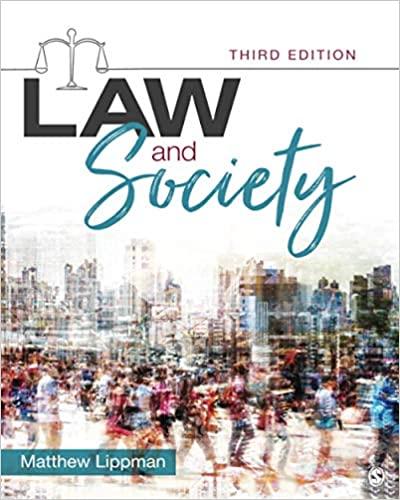Question
Q1)Given that utilitarians acknowledge that we often do not know with certainty what the future consequences of our actions will be, is utilitarianism an effective
Q1)Given that utilitarians acknowledge that we often do not know with certainty what the future consequences of our actions will be, is utilitarianism an effective tool for ethical decision-making? What if the 'good' that the utilitarian foresees does not eventuate? Additionally, how do we measure 'units' of pleasure and pain? Provide a few examples to explain your answer
Q2)A well known Native American proverb assert a 'Only when the last tree has died and the last river has been poisoned and the last fish caught will we realise we cannot eat money'. While it is important for a business to be economically sustainable is it equally important that our environment is sustained? Can business survive in the future if the environment is damaged beyond repair? How important is environmental sustainability in order for humans to survive? provide examples to support your answer.
Q3)Give an example of an ethical dilemma. What theory wouldyou chose to help you resolve it? Explain your answer with the help of examples and normative theories.
Case study 10.1 Changing Jobs and Changing Loyalties
CYNTHIA MARTINEZ WAS THRILLED WHEN SHE first received the job offer from David Newhoff at Crytex Systems. She had long admired Crytex, both as an industry leader and as an ideal employer, and the position the company was offering her was perfect. "It's just what I've always wanted," she told her husband, Tom, as they uncorked a bottle of champagne. But as she and Tom talked, he raised a few questions that began to trouble her.
"What about the big project you're working on at Altrue right now? It'll take three months to see that through," Tom reminded her. "The company has a lot riding on it, and you've always said that you're the driving force behind the project. If you bolt, Altrue is going to be in a real jam."
Cynthia explained that she had mentioned the project to David Newhoff. "He said he could understand that I'd like to see it through, but Crytex needs someone right now. He gave me a couple of days to think it over, but it's my big chance."
Tom looked at her thoughtfully and responded, "But Newhoff doesn't quite get it. It's not just that you'd like to see it through. It's that you'd be letting your whole project team down. They probably couldn't do it without you, at least not the way it needs to be done. Besides, Cyn, remember what you said about that guy who quit the Altrue branch in Baltimore."
"That was different," Cynthia responded. "He took an existing account with him when he went to another firm. It was like ripping Altrue off. I'm not going to rip them off, but I don't figure I owe them anything extra. It's just business. You know perfectly well that if Altrue could save some money by laying me off, the company wouldn't hesitate."
"I think you're rationalizing," Tom said. "You've done well at Altrue, and the company has always treated you fairly. Anyway, the issue is what's right for you to do, not what the company would or wouldn't do. Crytex is Altrue's big competitor. It's like you're switching sides. Besides, it's not just a matter of loyalty to the company, but to the people you work with. I know we could use the extra money, and it would be a great step for you, but still ..."
They continued to mull things over together, but the champagne no longer tasted quite as good. Fortunately, she and Tom never really argued about things they didn't see eye to eye on, and Tom wasn't the kind of guy who would try to tell her what she should or shouldn't do. But their conversation had started her wondering whether she really should accept that Crytex job she wanted so much.
DISCUSSION QUESTIONS:
2. Would it be unprofessional of Cynthia to drop everything and move to Crytex? Would it show a lack of integrity? Could moving abruptly to Crytex have negative career consequences for her?
3. Is it morally wrong, morally permissible or morally required for Cynthia to take the new job? Examine Cynthia's choice from a utilitarian point of view. How would Kant and Ross look at her situation?
4. What does loyalty to the company mean and how important is it, morally?
5.Under what circumstances do employees owe loyalty to their employers? When, if ever,do they owe loyalty to their coworkers?
Step by Step Solution
There are 3 Steps involved in it
Step: 1

Get Instant Access to Expert-Tailored Solutions
See step-by-step solutions with expert insights and AI powered tools for academic success
Step: 2

Step: 3

Ace Your Homework with AI
Get the answers you need in no time with our AI-driven, step-by-step assistance
Get Started


